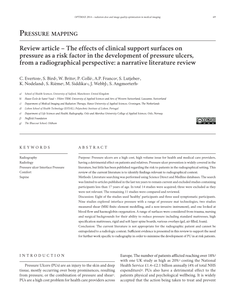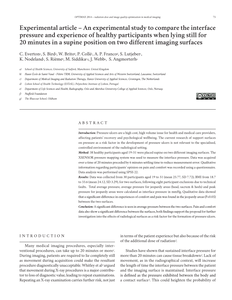Research conducted by the Research Group Study Success indicates that many students experience performance pressure. In addition, we’ve noticed an increase in performance pressure in recent years. A little bit of performance pressure can be a good thing: it can facilitate concentration or hitting your deadlines. Are you feeling pressured over extensive periods of time, or are you experiencing stress, lack of sleep, or decreased concentration due to concerns about delivering on performance? Then it is probably a good plan to spring into action. With this info sheet we will explain what performance pressure entails, what causes it, and we will offer suggestions on how to handle performance pressure.
DOCUMENT

The literature on how organizations respond to institutional pressure has shown that the individual decision-makers’ interpretation of institutional pressure played an important role in developing organizational responses. However, it has paid less attention to how this interpretation ultimately contributes to their range of organizational decisions when responding to the same institutional pressure. We address this gap by interviewing board members of U.S. and Dutch hospitals involved in adopting best practices regarding board evaluation. We found four qualitatively different cognitive frames that board members relied on to interpret institutional pressure, and which shaped their organizational response. We contribute to the literature on organizational response to institutional pressure by empirically investigating how decision-makers interpret institutional pressure, by suggesting prior experience and role definition as moderating factors of multidimensional cognitive frames, and by showing how these cognitive frames influence board members’ response to the same institutional pressure.
DOCUMENT

Objective. In this study an experimental set-up for measuring skin microvascular responses of the footsole to changes in externally applied pressure was analysed. Design. A clinical study. Skin microvascular blood flow was measured in healthy volunteers, during and after external mechanical pressure of different magnitudes. Background. During standing and walking the footsole is commonly exposed to high static and dynamic mechanical pressure, resulting in changes in the microcirculation of the footsole. In diabetic patients a disturbed interaction between externally applied pressure and skin microvascular response seems to be involved in the development of a foot ulcer. Methods. Eleven volunteers participated in the study. Static loads were applied to the heel part of the footsole with the person in a supine position. Contact pressure and skin blood flux, based on the laser Doppler technique, were simultaneously monitored. The pressure used was varied in five discrete steps between 10 and 160 kPa and applied during a period of 5 min each. The microcirculation was measured during as well as after pressure loading. Results. Pressures of 40 kPa and higher do stop the blood flow in the skin micro-circulation. Releasing the applied pressure resulted in a hyperaemic response. This response appears to increase in amplitude at increasing pressures up to 800% of the baseline laser Doppler fluxmetry level. Beyond a pressure level of 80 kPa the hyperaemic response seems not to be influenced by the pressure level. The time needed to achieve the maximal laser Doppler fluxmetry level decreased when the pressure was raised from 10 to 80 kPa, but increased again when higher pressures were applied (P = 0.051). An intra-individual variation of 11-50% was observed for the parameters describing the blood flux before, during, and after pressure application. Conclusion. Simultaneously measuring changes in contact pressure and laser Doppler flux of the footsole is a useful method to study the interaction of external mechanical pressure and skin microvascular reactions. Pressures above 40 kPa stop skin microvascular blood flow. Releasing the applied pressure results in a hyperaemic response, which increases when the applied pressure increases from 40 to 80 kPa. Higher pressures do not influence the amplitude in skin microvascular response, but result in a longer delay to maximal hyperaemia.
DOCUMENT
This GitHub repository contains the code for a RShiny App for the calculation of center of pressure parameters for individuals performing a balance task. Such data can be obtained from (consumer grade) force plates like the AMTI, Kistler, Bertec or Wii Balance Board.
LINK
With the increased adoption of real-time objective measurements of player experience, advances have been made in characterising the dynamically changing aspects of the player experience during gameplay itself. A direct coupling to player action, however, is not without challenges. Many physiological responses, for instance, have an inherent delay, and often take some time to return to a baseline, providing challenges of interpretation when analysing rapidly changing gameplay on a micro level of interaction. The development of event-related, or phasic, measurements directly coupled to player actions provides additional insights, for instance through player modelling, but also through the use of behavioural characteristics of the human computer interaction itself. In this study, we focused on the latter, and measured keyboard pressure in a number of different, fast-paced action games. In this particular case, we related specific functional game actions (keyboard presses) to experiential player behaviour. We found keyboard pressure to be higher for avoidance as compared to approach-oriented actions. Additionally, the difference between avoidance and approach keyboard pressure related to levels of arousal. The findings illustrate the application potential of qualifying players’ functional actions at play (navigating in a game) and interpret player experience related to these actions through players’ real world behavioural characteristics like interface pressure.
MULTIFILE

Purpose: Pressure ulcers are a high cost, high volume issue for health and medical care providers, having a detrimental effect on patients and relatives. Pressure ulcer prevention is widely covered in the literature, but little has been published regarding the risk to patients in the radiographical setting. Thisreview of the current literature is to identify findings relevant to radiographical context.Methods: Literature searching was performed using Science Direct and Medline databases. The search was limited to articles published in the last ten years to remain current and excluded studies containing participants less than 17 years of age. In total 14 studies were acquired; three were excluded as they were not relevant. The remaining 11 studies were compared and reviewed.Discussion: Eight of the studies used ‘healthy’ participants and three used symptomatic participants. Nine studies explored interface pressure with a range of pressure mat technologies, two studies measured shear (MRI finite element modelling, and a non-invasive instrument), and one looked at blood flow and haemoglobin oxygenation. A range of surfaces were considered from trauma, nursing and surgical backgrounds for their ability to reduce pressure including standard mattresses, high specification mattresses, rigid and soft layer spine boards, various overlays (gel, air filled, foam).Conclusion: The current literature is not appropriate for the radiographic patient and cannot be extrapolated to a radiologic context. Sufficient evidence is presented in this review to support the need for further work specific to radiography in order to minimise the development of PU in at risk patients.
DOCUMENT

Musicians often play under circumstances in which pressure may lead to anxiety and performance deterioration. Theories suggest that a drop in performance is due to a shift in focus of attention towards task-irrelevant information. In this study, we asked music students to report what they think and where they focus attention in three situations: when they play under pressure (Study 1; n = 81), the moment just before choking under pressure and when they try to recover after a mistake (Study 2; n = 25). Focus of attention was examined using retrospective verbal reports and point-spread distributions. Besides a notable focus on music-related information (36.9%), music students reported a considerable number of worries and disturbing thoughts (26.1%) during playing under pressure (Study 1). Just before choking, they showed even more worries and disturbing thoughts (46.4%) at the cost of music-related focus (21.1%) (Study 2), as also confirmed by the point-spread distributions. During recovery after a mistake, attention was mainly focused on music-related information (53.0%) and less on thoughts that give confidence (18.5%) and physical aspects (16.6%). It is advisable to help music students with improving their performance, for example, by attentional control training or providing training with elevated levels of anxiety.
DOCUMENT

Background. Barefoot plantar pressure measurements are routinely used in the risk evaluation for ulceration in diabetic patients with neuropathy. The aim was to compare three step-protocols commonly used for pressure assessment in these patients. Methods. Dynamic barefoot plantar pressures were measured in 14 diabetic neuropathic patients (vibration perception threshold >35 V) contacting a pressure platform on the first, second or third step after gait initiation. Ten repeated trials per step-protocol were collected. The 3-step protocol was regarded the reference protocol. Peak pressure, pressure-time integral and contact time were calculated for each of six anatomical foot regions. Intraclass correlation coefficients (ICC) were calculated to assess reliability in each protocol. Findings. Regional peak pressures and pressure-time integrals were not significantly different between protocols. Contact time was significantly different in the heel region between the 1-step and 3-step protocol only (P < 0.05). Intraclass correlation coefficients for the maximum 10 repeated trials were high (>0.87) and similar between protocols. Reliable estimates (ICC > 0.85) of peak pressure were achieved with three repeated trials in the 2-step protocol, and four in the other two; for pressure-time integral these numbers were 7 (1-step), 4 (2-step), and 5 trials (3-step). Interpretation. Barefoot plantar pressures in the diabetic neuropathic foot can be assessed in a reproducible manner with any of the step-protocols used. For this purpose, the 1-step and 2-step protocols prove to be valid methods. A 2-step protocol requires the least amount of repeated trials for obtaining reliable pressure data and may be recommended for assessment of these patients.
DOCUMENT
The Co-Design Pressure Cooker was set up to gather knowledge on co-design in product development activities of Small-to-Medium Enterprises(SMEs). This booklet gives an impression of ten projects conducted in the Province of Utrecht, the Netherlands. In these ten projects, a total of 22 companies were involved. 5000 booklets have already been printed in Dutch and handed out to SMEs for knowledge dissemination. We have received ample requests from the international community, which leads us to believe that there is an international audience for the cases conducted and knowledge gathered. This is why we decided to publish an English version of this booklet. The booklet will be followed by a scientific publication on the knowledge gathered for the academic community. Feel free to contact us for more information on this project
DOCUMENT

Introduction: Pressure ulcers are a high cost, high volume issue for health and medical care providers, affecting patients’ recovery and psychological wellbeing. The current research of support surfaces on pressure as a risk factor in the development of pressure ulcers is not relevant to the specialised, controlled environment of the radiological setting. Method: 38 healthy participants aged 19-51 were placed supine on two different imaging surfaces. The XSENSOR pressure mapping system was used to measure the interface pressure. Data was acquired over a time of 20 minutes preceded by 6 minutes settling time to reduce measurement error. Qualitative information regarding participants’ opinion on pain and comfort was recorded using a questionnaire. Data analysis was performed using SPSS 22. Results: Data was collected from 30 participants aged 19 to 51 (mean 25.77, SD 7.72), BMI from 18.7 to 33.6 (mean 24.12, SD 3.29), for two surfaces, following eight participant exclusions due to technical faults. Total average pressure, average pressure for jeopardy areas (head, sacrum & heels) and peak pressure for jeopardy areas were calculated as interface pressure in mmHg. Qualitative data showed that a significant difference in experiences of comfort and pain was found in the jeopardy areas (P<0.05) between the two surfaces. Conclusion: A significant difference is seen in average pressure between the two surfaces. Pain and comfort data also show a significant difference between the surfaces, both findings support the proposal for further investigation into the effects of radiological surfaces as a risk factor for the formation of pressure ulcers.
DOCUMENT
